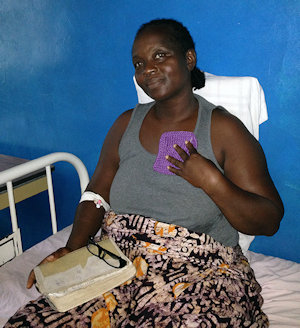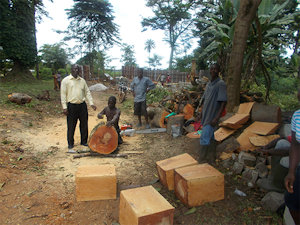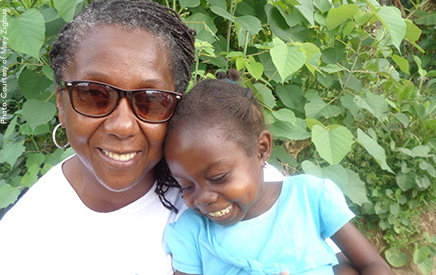A United Methodist missionary is at work in Liberia supporting community based health care.
MARY ZIGBUO
United Methodist Missionary
See, I have inscribed you on the palms of my hands; your walls are continually before me. Isaiah 49:16 (NRSV)
This passage from Isaiah assures us that we are safe in God’s hands. For me, the work of mission is like a remarkable safety net for God’s people. Those who are at risk of “falling through the cracks” are rescued by the safety nets provided through our response in mission.

I serve as a Global Ministries missionary in Liberia in a health strengthening support role, working alongside our United Methodist Health Board, UM Health Coordination Office, and the leaders and staff of five United Methodist health facilities. The United Methodist Church in Liberia provides Christ-centered, compassionate health care services for more than half a million people—mostly subsistence farming families—living in three counties in Liberia and one town in Guinea.
From January through March of 2015, Behwan Town was one of three southeastern towns that benefitted from an UMCOR-sponsored food security and Ebola awareness intervention. A one-month food supply was given to 900 beneficiaries who met the following criteria: abandoned elderly persons, vulnerable persons with disabilities, or vulnerable pregnant women. Selected community residents, leaders, teachers, and others were trained as Ebola Awareness Trainers and accepted the responsibility of spreading preventive measures across a wider geographic area.
I met 11-year-old Mary in Behwan Town. An enlarged abdomen caused Mary to walk with a sideways limp, which qualified her to receive a one-month food subsidy. She captured the hearts of everyone on our team. Her family explained that, over the course of two years, though Mary was taken back and forth to a local health facility, the medical staff there was unable to address her condition.
Our team contributed funds so that Mary could receive medical attention at the regional hospital in Tappita, located about 100 miles away. When Mary and her mom made the tedious journey to Tappita, they were joyfully received and hosted by the Rev. Victoria Dennis, the principal of Tappita United Methodist School. Mary’s condition was eventually diagnosed as an enlarged spleen, and she required an urgent surgical intervention.
However, surgery was postponed for two more weeks because she was malnourished. The medical team prescribed nutritional supplements to build up her fragile immune system. Yet two months after the operation, not only had Mary recuperated, but for the first time in her life, she attended school! “Adopted” by the Tappita community that hosted and prayed for and with her, Mary has remained in Tappita with her new-found extended family—with her mother’s blessing—so that she can be near the medical facility and continue her schooling.
Rev. Dennis, the doctors and nurses, as well as all those who support United Methodist health work provided the safety net that prevented Mary from dying of a treatable medical condition. The course of events points to my testimony that God has a wonderful plan for this little one!
Health Work Transitions
I arrived back in Liberia in November of 2014 during the Ebola emergency in western Africa for a special six-month Ebola response and health-strengthening support assignment. But I had served in Liberia as a missionary with my late husband Herbert for more than 20 years before then.
Over the past months, I’ve had the privilege of serving alongside my Liberian colleagues toward our collective goal of responding to the Ebola crisis while ensuring the continuous operation and ongoing development of our health-care system. I’ve supported four UMCOR International Disaster Response Ebola interventions, traveling throughout the country, and I have witnessed The United Methodist Church of Liberia’s relevant, resourceful, Christ-centered ministries of education, health care, social justice, agriculture, and other remarkable efforts aimed at improving the quality of life for God’s people.
“For me, the work of mission is like a remarkable safety net for God’s people.”
Now that Ebola is no longer a crisis, I have remained in Liberia to support two very important administrative transitions: at Ganta United Methodist Hospital and at the UMC Department of Health and Welfare. These two vital components of our health structure sustained administrative changes. The Liberia UMC Health Board developed comprehensive transition plans for the two entities and I am humbled to play a leading role in carrying out these plans.
Global Health’s 2015 Imagine No Malaria, Health Strengthening Support, and Maternal Child Health grants have greatly assisted our facilities’ efforts to develop drug revolving-fund systems, provide community-based health care (with special emphasis on maternal/child health), and improve specialized staff capabilities, administrative and local partner development capacity, physical structures, laboratory analysis, and water access for each facility. Improving these attributes will also attract greater client access and local support, thereby improving revenue.
Health-Care Facilities
With a collective staff of more 260 persons, our facilities provide treatment and other services through daily outpatient clinics, primary health-care programs and activities, a dental clinic, an orthopedic clinic, an eye clinic, a diabetes clinic, an HIV/Aids clinic, prenatal and postnatal clinics, mental health services, surgical services (through the facilities in Ganta, Weala, and Diecke), X-ray and ultrasonography services, laboratory services, in-patient services, and emergency triage.
Collective community-based health-care outreach activities include water and sanitation, malaria prevention, construction of birthing houses, targeted health talks, general health screening, immunization, traditional birth attendants training, and community health volunteer training, among other ministries.
Our facilities provide affordable health care and rely upon service fees to support operational budgets. Realistic fees cannot be charged to a public that struggles to support its basic needs—food, shelter, and clothing.

John Dean Town Clinic is located in an area where the road network is very challenging or nonexistent. Through wonderful partnership support, coupled with local contributions of labor and funds, we celebrate the new road just recently bulldozed to John Dean Town! Community-based primary health-care outreach efforts through all the health facilities improves the quality of life for people living in hundreds of communities in Grand Bassa, Nimba, and Margibi counties and the forest region of the Republic of Guinea.
Community engagement, health education, and empowerment are primary goals of our health-care ministry. I am humbled and amazed by the commitment of Rebecca Senyon, who, before the recent road construction, led her John Dean Town Clinic primary health-care team on a weekly four-hour walk (one way!) to hold an outreach clinic in Gbozon, where they gave health talks, traditional birth attendant training, and other interventions aimed at improving the general health care of the people living in and around this remote community.
At the Diecke Clinic in the Republic of Guinea, Yah Boayue has demonstrated courageous efforts to move from a run-down building to a newly constructed facility. In a strange land, faced with language and cultural differences, Yah applied her God-given talents to finalize the construction of the new facility, while finding furniture, equipment, and personnel to maintain the clinic’s operation.
There are other remarkable, courageous, spirit-filled efforts worthy of mention. I continue to marvel at the creative and resourceful methods used in our response to the health needs of God’s people living under challenging circumstances.
Communities are trying their best to survive. Our resource-challenged facilities use creative means to stretch resources and incorporate cost-saving strategies. The Liberian Methodists are committed to strengthening communities to survive and thrive by providing comprehensive health services that promote healthier communities.
Mary Randall Zigbuo and her late husband, Herbert Zigbuo, served as missionaries in Liberia for more than 20 years, working in the areas of administration, education, health, and social-welfare ministries. Mary served in many roles over those years: as a guidance counselor at the Ganta United Methodist Mission Station School; a counselor for Liberian refugee students in Côte d’Ivoire; co-coordinator of Operation Classroom; and administrator of the Ganta United Methodist Hospital, to name a few. This article was originally published in the March-April 2016 issue of New World Outlook magazine.
Last Updated on December 15, 2023

